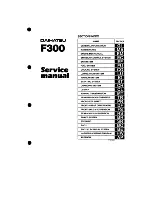
Generic term "child restraint system"
The generic term child restraint system is used
in this Operator's Manual. A child restraint sys‐
tem is, for example:
R
A baby car seat
R
A rearward-facing child seat
R
A forward-facing child seat
R
A child booster seat with a backrest and seat
belt guide
Mercedes-Benz recommends using a child
booster seat with a backrest.
The child restraint system must be appropriate
to the age, weight and size of the child.
Observing laws and legal requirements
Always observe the legal requirements when
using a child restraint system in the vehicle.
Observing standards for child restraint sys‐
tems
All child restraint systems must meet the follow‐
ing standards:
R
U.S. Federal Motor Vehicle Safety Standards
213 and 225
R
Canadian Motor Vehicle Safety Standards
213 and 210.2
Confirmation that the child restraint system
complies with the standards can be found on an
instruction label on the child restraint system.
This confirmation can also be found in the instal‐
lation instructions that are included with the
child restraint system.
Detecting risks, avoiding danger
Securing systems for child restraint systems
in the vehicle
Only use the following securing systems for child
restraint systems:
R
The LATCH-type (ISOFIX) mounting brackets
R
The vehicle's seat belt system
R
The Top Tether anchorages
Installing a LATCH-type (ISOFIX) child restraint
system is preferred.
Simply attaching to the securing rings on the
vehicle can reduce the risk of installing the child
restraint system incorrectly.
When securing a child with the integrated seat
belt of the LATCH-type (ISOFIX) child restraint
system, always comply with the permissible
gross weight for the child and child restraint sys‐
tem (
/
page 55).
A booster seat may be necessary to achieve
proper seat belt positioning for children over
40 lbs (18 kg) in weight or until they reach a
height where a three-point seat belt can be fitted
properly without a booster seat.
Mercedes-Benz recommends a suitable child
booster seat with a backrest and seat belt guide.
Advantage of a rearward-facing child
restraint system
It is preferable to transport a baby or a small
child in a suitable rearward-facing child restraint
system. In this case, the child sits in the oppo‐
50 Occupant safety
Summary of Contents for S 450 2020
Page 8: ...6 At a glance Cockpit ...
Page 10: ...Head up Display 275 Rear window roller sunblind 91 8 At a glance Cockpit ...
Page 11: ......
Page 12: ...Instrument Display 10 At a glance Indicator and warning lamps ...
Page 14: ...12 At a glance Overhead control panel ...
Page 16: ...14 At a glance Door control panel and seat adjustment ...
Page 20: ...18 At a glance Emergencies and breakdowns ...
Page 600: ......
Page 601: ......
Page 602: ......
















































